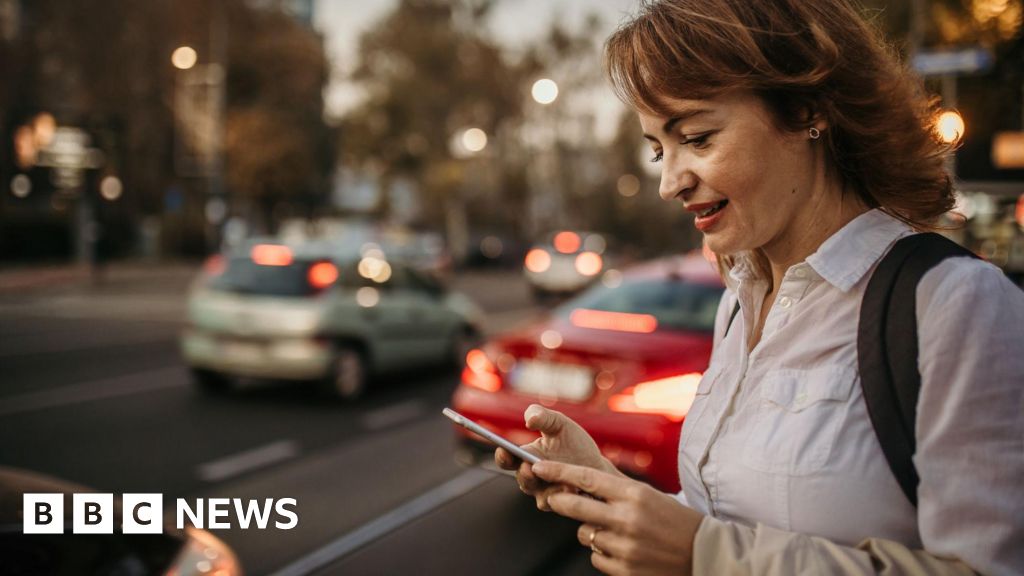People waiting for an Uber should be patient enough to wait a few minutes longer for an electric car, the boss of the ride-hailing firm has said.
“A couple of minutes isn’t going to kill anyone,” Dara Khosrowshahi told the BBC in an interview.
Uber is rolling out new options to encourage customers to choose electric rides, but at the same time he says governments should be doing more to support sales of electric vehicles (EVs).
Cheaper, Chinese-made electric vehicles are also “good for the environment” he said.
Despite that, many countries are pushing back against the import of Chinese EVs because they see them as unfair competition for domestic carmakers.
“High quality” Chinese-made EVs are part of the solution to the climate crisis, Mr Khosrowshahi said.
He also called on the new UK government to stick to its pre-election pledge and end the sale of new petrol and diesel cars from 2030, after the previous government pushed the deadline back to 2035.
Wait longer
Uber’s push to get customers to pick the green ride option is part of the company’s overall sustainability aims – that all its car journeys and deliveries should be carried out in “zero emissions vehicles” by 2040.
But the ambition is set to become more challenging as it plans to expand beyond cab rides and food delivery.
Customers can already pick an EV when they book an Uber. A new option will allow them to register a permanent preference for taking an electric vehicle.
Most Ubers are still petrol, diesel or hybrid vehicles, so it is likely customers will have to wait a little longer for an EV to arrive.
“We’re not saying, hey, wait 15 minutes, but if you have to wait another two, three minutes to help the environment, why not make that investment?” Mr Khosrowshahi said.
In London, almost a third of Uber drivers have invested in an EV, so the difference in waiting times may not be long. But EV uptake is lower elsewhere in the UK and worldwide. In European cities such as Amsterdam, Berlin, Brussels, Lisbon, Madrid and Paris only 20% of the miles driven by Uber vehicles are fully electric.
As well as benefiting the planet, Mr Khosrowshahi believes the shift to electric will benefit Uber’s business in the long run.
However, he says the firm currently makes a smaller profit margin on electric car rides.
Uber is also introducing more delivery services, hoping to challenge rivals on things like household products and groceries.
“You can get pet food from your local shop with an Uber courier within the next hour or two,” said Mr Khosrowshahi.
“Ultimately we think that [it] can be even better than Amazon,” he said.
Critics have pointed out that ride-hailing and delivery services have already contributed to a rise in the number of car journeys being made, whether that’s swapping a night bus for a cab ride, or getting a bubble tea delivered to your desk.
Tariff problem
Mr Khosrowshahi said he understood that governments had broader things to consider around tariffs on electric vehicles, but saw Chinese-made vehicles as part of the solution.
“For us we want to electrify our fleet and we want to make sure that it is affordable for our drivers,” he said.
Price is one of the biggest obstacles to the broader take-up of electric cars.
Concerns over electric charging infrastructure have also contributed to EV sales stalling in many parts of the world.
Mr Khosrowshahi said he thought governments should be providing more support for the switch to electric, including in the UK, but he would like that support to be targeted at those who drive the most, such as Uber drivers, or for corporate fleets, rather than individuals.
“The Uber driver drives four to five times the miles of average drivers,” he said.
Carmakers are calling for subsidies to be more balanced between business and individual buyers to encourage demand more broadly.
The US and European Union (EU) argue the Chinese are unfairly subsiding their carmakers and have imposed tariffs – or import taxes – to bring prices of Chinese cars more into line with domestic manufacturers.
The UK has not imposed tariffs on Chinese-made cars.
Using tariffs to make Chinese cars more expensive for European and American consumers was “negative” for the planet, Mr Khosrowshahi said.
Without such tariffs, cars made by Chinese firms could potentially be supplied more cheaply to consumers in US and EU.
Uber also has a tie-up with Chinese carmaker BYD, the second-largest EV company after Elon Musk’s Tesla.
